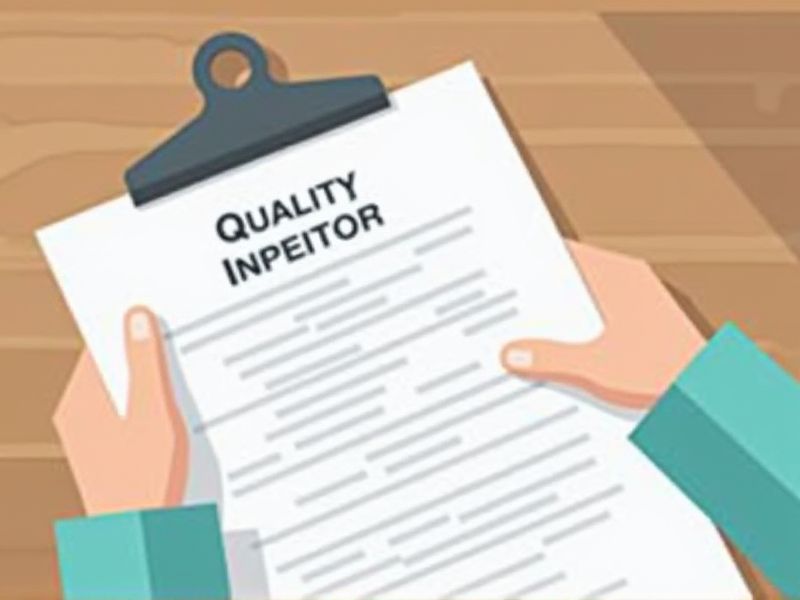
Quality Control Inspectors play a crucial role in ensuring that products meet specific standards, and certifications validate their expertise in this area. These certifications provide standardized training and knowledge, enhancing an inspector's ability to identify and rectify potential defects efficiently. Employers often require certifications as they assure a level of competency and adherence to industry regulations. Below are some key certifications that may be necessary for a Quality Control Inspector.
Certified Quality Inspector (CQI - ASQ)
Certified Quality Inspectors (CQI) possess standardized knowledge and skills, enhancing consistency in quality control processes. Their training enables them to identify defects efficiently, reducing costs associated with rework and wastage. The certification often leads to improved problem-solving capabilities, facilitating proactive measures in maintaining product standards. Holding a CQI credential generally increases credibility with employers, leading to better career opportunities and advancements.
Certified Quality Technician (CQT - ASQ)
Certified Quality Technicians (CQT - ASQ) possess validated skills that enhance the precision and effectiveness of a Quality Control Inspector's role. Certification ensures that inspectors have a thorough understanding of quality tools and statistical techniques critical for accurate inspections. When quality control professionals are CQT-certified, companies experience improved product quality and reduced defect rates. The credential signals to employers a commitment to excellence and adherence to industry standards, reinforcing the inspector's credibility.
Certified Quality Improvement Associate (CQIA - ASQ)
Certified Quality Improvement Associate (CQIA - ASQ) provides foundational quality management principles that enhance a Quality Control Inspector's ability to assess and ensure product standards. Understanding these principles strengthens their capability in identifying process inefficiencies, leading to improved production quality. CQIA certification equips inspectors with tools to implement effective problem-solving techniques, reducing defects and waste. Enhanced skills in quality improvement foster a culture of continuous improvement, directly influencing operational excellence.
ISO 9001 Lead Auditor Certification
ISO 9001 Lead Auditor Certification equips a Quality Control Inspector with comprehensive knowledge of international quality management standards, enhancing overall inspection effectiveness. The certification strengthens the inspector's ability to identify non-conformities and areas for improvement in organizational processes. Possessing this certification often increases credibility and assures stakeholders of the inspector's proficiency in maintaining high-quality standards. Organizations tend to prefer certified professionals to drive consistency in quality outcomes and comply with regulatory requirements.
Six Sigma Green Belt Certification
Six Sigma Green Belt Certification equips Quality Control Inspectors with advanced problem-solving tools to reduce defects and improve process quality. Training in Six Sigma methodology enhances analytical skills necessary for identifying inefficiencies in production. Knowledge in statistical analysis gained through certification aids inspectors in data-driven decision-making, leading to more consistent quality outcomes. Certification increases the inspector's ability to implement efficiency improvements, resulting in cost savings and enhanced product quality for the organization.
Six Sigma Black Belt Certification
Quality control inspectors utilize Six Sigma Black Belt Certification to access advanced statistical tools and methodologies, leading to more precise defect detection and process improvement. The certification instills a data-driven mindset, enhancing decision-making and reducing variability in production. It signals a high level of competence, boosting trust among stakeholders and facilitating collaboration with cross-functional teams. Organizations often require this certification to align with industry standards, improving overall operational efficiency and competitiveness.
Lean Six Sigma Certification
Lean Six Sigma Certification provides a structured approach to problem-solving that enables Quality Control Inspectors to improve processes and reduce defects. Certification imparts statistical tools and methodologies that help inspectors analyze data effectively, leading to better decision-making. It instills a culture of continuous improvement, which aligns with the objectives of quality control in achieving higher product standards. Industries value the certification, often requiring it to demonstrate proficiency and commitment to maintaining quality.
Certified Manager of Quality/Organizational Excellence (CMQ/OE - ASQ)
The CMQ/OE certification elevates a Quality Control Inspector's ability to implement effective quality management practices, resulting in improved process efficiencies. This certification sharpens their problem-solving skills, which enhances defect detection accuracy and reduces production errors. By understanding organizational excellence principles, inspectors can align quality objectives with broader business goals, driving overall productivity. Certification credibility can boost stakeholder confidence, which may lead to stronger partnerships and increased business opportunities.
HACCP Certification
HACCP certification establishes a structured framework for identifying and controlling food safety hazards, which is crucial for a Quality Control Inspector to ensure product safety. It instills confidence in customers and partners that the organization's food safety practices meet international standards. Through HACCP, Quality Control Inspectors can effectively monitor critical control points, reducing the risk of contamination and foodborne illnesses. The certification aids inspectors in maintaining regulatory compliance, which is vital for preventing potential legal and financial repercussions.
Total Quality Management (TQM) Certification
TQM Certification equips Quality Control Inspectors with a structured approach to managing and improving quality processes, which often leads to enhanced product standards. Possessing a TQM Certification increases credibility and trust among stakeholders, as it reflects a commitment to quality excellence. It also enables inspectors to identify inefficiencies, thus reducing waste and increasing productivity. In competitive industries, certification provides a strategic advantage by aligning with international standards and promoting continuous improvement.
Summary
By obtaining certifications, you can enhance your credibility and demonstrate your expertise in quality control processes. This recognition often leads to improved job prospects and potentially higher salary opportunities. Employers may notice an increase in operational efficiency and reduced defects due to your advanced skills. Overall, certification aligns your abilities with industry standards, making you a valuable asset to your organization.
